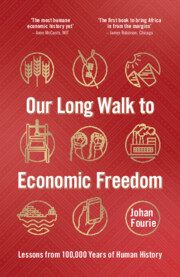Book contents
- Our Long Walk to Economic Freedom
- Our Long Walk to Economic Freedom
- Copyright page
- Dedication
- Contents
- Figures
- Acknowledgements
- A Note on Sources and Terminology
- How Do We Thrive?
- 1 Who Are the Architects of Wakanda?
- 2 What Happened at Blombos in 70,000 BCE?
- 3 Why Are the Danes So Individualistic?
- 4 Why Does isiXhosa Have Clicks?
- 5 How Did Joseph and His Eleven Brothers Solve the Three Economic Problems?
- 6 What Do Charlemagne and King Zwelithini Have in Common?
- 7 Why Do Indians Have Dowry and Africans Lobola?
- 8 Who Was the Richest Man Ever to Live?
- 9 How Did 168 Spanish Conquistadores Capture an Empire?
- 10 Why Was a Giraffe the Perfect Gift for the Chinese Emperor?
- 11 Who Visited Gorée Island on 27 June 2013?
- 12 What Is an Incunabulum?
- 13 Who Was Autshumao’s Niece?
- 14 What Did Thomson, Watson & Co. Purchase?
- 15 What Do an Indonesian Volcano, Frankenstein and Shaka Zulu Have in Common?
- 16 Why Was the Spinning Jenny Not Invented in India?
- 17 Why Did Railways Hurt Basotho Farmers?
- 18 What Did Sol Plaatje Find on His Journey through South Africa?
- 19 Why Can You Have Any Car as Long as It Is Black?
- 20 What Does a Butterfly Collector Do in the Congo?
- 21 Who Wrote the Best Closing Line of Modern Literature?
- 22 How Could a Movie Embarrass Stalin?
- 23 Who Is the Perfect Soldier?
- 24 What Was the Great Leap Forward?
- 25 Why Should We Cry for Argentina?
- 26 Who Was the Last King of Scotland?
- 27 How Did Einstein Help Create Eskom?
- 28 Why Would You Want to Eat Sushi in the Transkei?
- 29 Why Do the Japanese Play Rugby?
- 30 What Do Lego and the Greatest Invention of the Twentieth Century Have in Common?
- 31 What Is Funny about Moore’s Law?
- 32 What Bubbles in Iceland?
- 33 What Did The Economist Get Spectacularly Wrong?
- 34 Will Madiba’s Long Walk to Freedom Ever End?
- 35 What Should No Scholar Ever Do?
- Epilogue
- Notes
- Bibliography
- Index
16 - Why Was the Spinning Jenny Not Invented in India?
Science, Technology and the Industrial Revolution
Published online by Cambridge University Press: 30 August 2022
- Our Long Walk to Economic Freedom
- Our Long Walk to Economic Freedom
- Copyright page
- Dedication
- Contents
- Figures
- Acknowledgements
- A Note on Sources and Terminology
- How Do We Thrive?
- 1 Who Are the Architects of Wakanda?
- 2 What Happened at Blombos in 70,000 BCE?
- 3 Why Are the Danes So Individualistic?
- 4 Why Does isiXhosa Have Clicks?
- 5 How Did Joseph and His Eleven Brothers Solve the Three Economic Problems?
- 6 What Do Charlemagne and King Zwelithini Have in Common?
- 7 Why Do Indians Have Dowry and Africans Lobola?
- 8 Who Was the Richest Man Ever to Live?
- 9 How Did 168 Spanish Conquistadores Capture an Empire?
- 10 Why Was a Giraffe the Perfect Gift for the Chinese Emperor?
- 11 Who Visited Gorée Island on 27 June 2013?
- 12 What Is an Incunabulum?
- 13 Who Was Autshumao’s Niece?
- 14 What Did Thomson, Watson & Co. Purchase?
- 15 What Do an Indonesian Volcano, Frankenstein and Shaka Zulu Have in Common?
- 16 Why Was the Spinning Jenny Not Invented in India?
- 17 Why Did Railways Hurt Basotho Farmers?
- 18 What Did Sol Plaatje Find on His Journey through South Africa?
- 19 Why Can You Have Any Car as Long as It Is Black?
- 20 What Does a Butterfly Collector Do in the Congo?
- 21 Who Wrote the Best Closing Line of Modern Literature?
- 22 How Could a Movie Embarrass Stalin?
- 23 Who Is the Perfect Soldier?
- 24 What Was the Great Leap Forward?
- 25 Why Should We Cry for Argentina?
- 26 Who Was the Last King of Scotland?
- 27 How Did Einstein Help Create Eskom?
- 28 Why Would You Want to Eat Sushi in the Transkei?
- 29 Why Do the Japanese Play Rugby?
- 30 What Do Lego and the Greatest Invention of the Twentieth Century Have in Common?
- 31 What Is Funny about Moore’s Law?
- 32 What Bubbles in Iceland?
- 33 What Did The Economist Get Spectacularly Wrong?
- 34 Will Madiba’s Long Walk to Freedom Ever End?
- 35 What Should No Scholar Ever Do?
- Epilogue
- Notes
- Bibliography
- Index
Summary
There was nothing special about James Hargreaves. Born in 1721 near Blackburn in Lancashire, he never learned to read. As he grew to adulthood his only job prospect was that open to other Blackburn men of his standing: he became a hand-loom weaver who turned yarn into fabric to make a living. From his meagre salary he supported his wife and thirteen children.
Eighteenth-century England was an important textile producer. To produce fabric from wool or cotton requires three steps: carding, spinning and then weaving. At the time, it usually took three carders to provide the roving for one spinner, and three spinners to provide the yarn for one weaver. To increase the amount of fabric, one needed to speed up the process early in the chain of production. And so, in 1764, the story goes, Hargreaves was working with a one-thread spinning wheel when it accidentally fell over.
Keywords
- Type
- Chapter
- Information
- Our Long Walk to Economic FreedomLessons from 100,000 Years of Human History, pp. 88 - 94Publisher: Cambridge University PressPrint publication year: 2022

